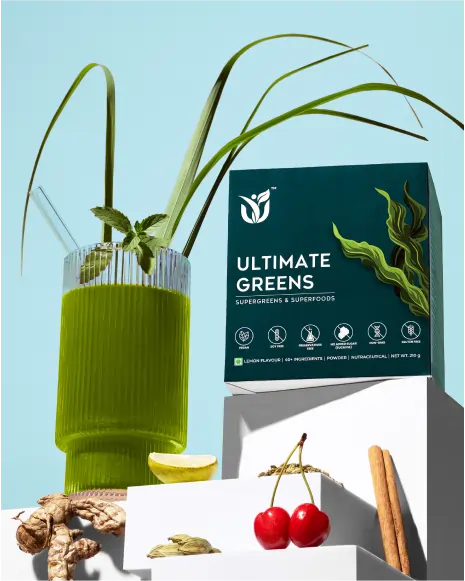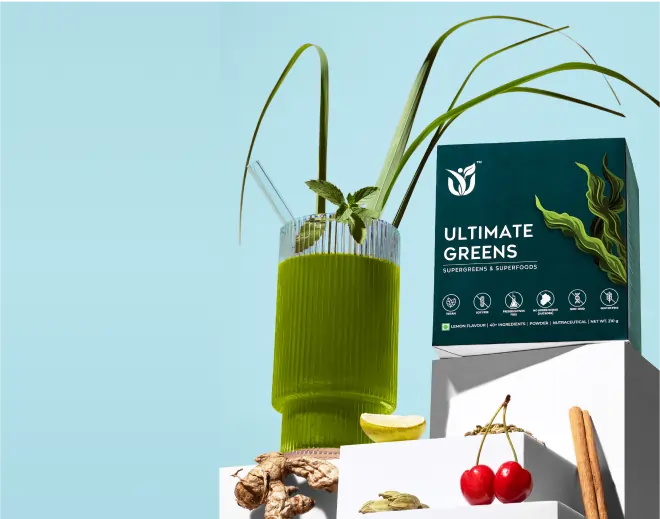Boost your skin’s radiance with glutathione-rich foods, which fight oxidative stress, promote collagen production, and help lighten skin for a natural glow.
In the pursuit of a radiant and even-toned complexion, countless women find themselves navigating through various skin-whitening solutions. Despite trying countless skincare products, you might even get frustrated as you couldn't achieve the even-toned skin you wished for.
Some methods may prove ineffective or even harmful. What could be the affordable solution? Include glutathione-rich foods in your diet. While they offer promise, excessive consumption can lead to digestive issues. So, before making any big changes to your diet, it's important to talk to a doctor to make sure you're making the right choices for your body!
Now, let's explore the best glutathione rich foods for skin whitening, the advantages they provide, and other pertinent details.
What is Glutathione?
Glutathione is often referred to as the “mother of all antioxidants” as per ScienceDirect. It is a key player in numerous processes, including skin pigmentation. As we age, our glutathione levels naturally decline, contributing to an uneven skin tone and the appearance of age spots or hyperpigmentation. This is where the benefits of glutathione rich foods come into play.
These nutrient-dense foods, such as broccoli, oranges, and walnuts, replenish our glutathione reserves and offer a wealth of other skin-enhancing benefits. From avocados, packed with healthy fats and vitamins, to spinach, a powerhouse of antioxidants and minerals, these foods nourish our skin from the inside out.
Notably, many of these foods have been revered in ancient traditions for their beauty-enhancing properties. For instance, turmeric, a staple in Indian cuisine, has been trusted for centuries in Ayurvedic practices for its ability to promote a radiant complexion. This enduring use is a testament to their reliability and effectiveness, making them a compelling option.
So, instead of turning to harsh chemicals or questionable treatments, consider embracing the power of glutathione rich foods. Enjoy their vibrant flavours, revel in their nutritional benefits, and let your skin radiate from the inside out. Why not start today by adding a handful of top glutathione foods to your breakfast or enjoying a spinach salad for lunch?
Role of Glutathione in Skin Whitening
Glutathione has gained popularity in recent times for its purported role in skin whitening due to its ability to inhibit melanin production, which determines skin pigmentation. While it is widely used in supplements, creams, and injections for skin lightening, there is inconclusive scientific evidence supporting its efficacy.
Research does suggest that glutathione may help reduce oxidative stress and improve overall skin health. However, it's important to note that individual responses to glutathione supplementation can vary, and further study is needed to evaluate its long-term effects and safety concerns.
Supplements vs. Natural Sources: What's Best for Skin Whitening?
The debate between supplements and natural sources for skin whitening is a complex one, with efficacy, safety, and overall health benefits at the forefront. Supplements like glutathione pills or capsules are often marketed for their ability to lighten skin tone by inhibiting melanin production. However, it's important to note that the scientific evidence supporting their effectiveness is inconclusive, and concerns exist regarding their potential side effects and long-term safety.
On the other hand, natural sources of skin-enhancing nutrients such as vitamins C and E, found abundantly in fruits, vegetables, and nuts, are a reliable choice. These nutrients fight off the free radicals and help keep your skin healthy. Foods rich in beta-carotene, like carrots and sweet potatoes, can also contribute to a healthier complexion by supporting skin cell turnover and repair.
Opting for natural sources over supplements not only addresses skin whitening but also offers a host of additional benefits. Whole foods provide a rich array of vitamins, minerals, and phytonutrients that synergistically support immune function, cardiovascular health, and overall well-being.
Ultimately, the path to achieving and maintaining healthy, glowing skin is not a single road but a comprehensive approach. This includes a nutritious diet, sufficient hydration, sun protection, and a skincare regimen tailored to individual needs.
Benefits of Consuming High Glutathione Foods
Eating glutathione-rich foods offers numerous health benefits beyond just skin improvement. These benefits include:
Enhanced Immune Function: Glutathione makes our immune cells strong so we can fight off germs and harmful bacteria.
Detoxification: It aids in detoxifying harmful substances by binding to toxins and facilitating their elimination from the body, which is particularly important for liver health.
Antioxidant Defence: Protects cells from damage caused by free radicals, which contribute to ageing, inflammation, and various chronic diseases.
Skin Health: While direct absorption of dietary glutathione is limited, consuming glutathione-rich foods and nutrients that support its production can promote healthier skin.
Anti-Ageing Benefits: Helps maintain cellular health and function, slowing the ageing process and supporting longevity.
Energy Production: Supports mitochondrial function, aiding in energy production and overall vitality.
Cardiovascular Health: It offers protection against heart disease by decreasing oxidative stress and inflammation in the blood vessels.
Brain Health: Glutathione's antioxidant properties may protect brain cells from damage and support cognitive function.
Incorporating glutathione-rich foods like spinach, avocados, asparagus, garlic, and walnuts, alongside a balanced intake of vitamins and minerals, can maximise health benefits. Supplements may be less effective due to limited absorption, so focusing on a diverse and nutrient-rich diet is key for reaping the full benefits of glutathione for overall health.
10 Effective Glutathione-Rich Foods for Brighter Skin Naturally
Here's a list of the top 10 glutathione-rich foods you can easily incorporate into your diet for skin whitening. Start nourishing your skin from within today!
- Black Pepper
- Whey Protein
- Watermelon
- Chia Seeds
- Cauliflower
- Strawberries
- Broccoli
- Spinach
- Garlic
- Almonds
1) Black Pepper
When it comes to glutathione-rich foods, black pepper is the first thing that comes to mind. Interestingly, black pepper contains a compound called piperine, which has been found to increase the body's glutathione production. This powerful antioxidant plays a crucial role in skin whitening and protecting against oxidative stress.
A teaspoon of freshly ground black pepper can provide up to 10% of your daily glutathione needs. But the benefits continue beyond that. It is also rich in other antioxidants, such as vitamin C, vitamin A, and flavonoids, which combat free radicals and promote even skin tone. The recommended daily intake of black pepper is around 1-2 teaspoons, which can be easily incorporated into meals or even consumed as a supplement. However, excessive consumption can cause digestive discomfort, so moderation is key.
Besides its skin-whitening properties, black pepper offers many other health benefits. It has been shown to improve digestion, boost metabolism, and have anti-inflammatory properties. Plus, its pungent flavour can enhance the taste of your dishes, making it a versatile addition to your culinary repertoire.
2) Whey Protein
Whey protein is derived from the leftover liquid when cheese is made. It contains glutathione natural sources, essential amino acids, and cysteine, which helps whiten skin and protect it from oxidative stress caused by environmental pollutants and UV radiation.
One scoop of whey protein powder can provide up to 25% of your daily glutathione needs. And the best part? It's easy to incorporate into your daily routine via morning smoothie, oatmeal, or even bake it into your favourite treats.
Beyond its skin-whitening benefits, it's an excellent source of high-quality protein, which can support muscle growth and recovery. The recommended daily whey protein intake varies depending on your needs, but most experts suggest consuming 20-30 grams daily. Always check with a doctor first if you have any health issues or specific diet needs.
3) Watermelon
Nothing quenches your thirst like a juicy slice of watermelon when the summer heat sets in. But did you know that this refreshing fruit is also a powerhouse of glutathione, making it a delicious option for radiant, even-toned skin?
Watermelon is one of the best glutathione fruits and plays a crucial role in the body's glutathione production, a potent antioxidant that combats free radicals and promotes skin whitening. A cup of watermelon can provide up to 10% of your daily glutathione needs. But the benefits of watermelon continue beyond there. This juicy fruit is also rich in vitamins A, C, and E, contributing to healthy, glowing skin. Its high water content makes your skin plump, minimising fine lines and wrinkles.
While there's no specific recommended daily intake for watermelon, experts suggest aiming for at least one cup daily to reap its skin-boosting benefits. With its refreshing flavour, it's easy to incorporate into your daily routine—blending it into a smoothie, tossing it into a salad, or enjoying it as a sweet and juicy snack.
4) Chia Seeds
Chia seeds, tiny but mighty, have earned their superfood status for their impressive nutritional profile. Rich in essential nutrients like omega-3 fatty acids, fibre, protein, and antioxidants, chia seeds offer many advantages for skin health.
Despite their small size, chia seeds contain glutathione, which plays a crucial role in skin whitening by inhibiting melanin production and lightening hyperpigmentation. Just a single ounce of chia seeds contains approximately 16% of the recommended daily intake. They contain amino acids that are essential for synthesising glutathione in the body, contributing to its skin-brightening effects.
Add them to smoothies, yoghurt, oatmeal, or salads for a nutrient boost. A recommended dosage of 1-2 tablespoons per day is sufficient to reap the benefits of chia seeds. Their high fibre content promotes digestive regularity, while omega-3 fatty acids support cardiovascular health and inflammation reduction. Out and out, embrace the power of chia seeds as a natural and effective way to achieve luminous, glowing skin.
5) Cauliflower
Cauliflower is a nutrient-rich cruciferous vegetable with powerful antioxidants for detoxifying the body and improving skin health.
Studies have shown that cauliflower vegetable contains more glutathione than many other commonly consumed veggies. One cup of raw cauliflower contains about 16 milligrams of glutathione, making it an excellent food for skin whitening. Additionally, cauliflower is low in calories and fibre, making it ideal for weight loss and digestion.
Besides its high glutathione content, Cauliflower is a nutritional powerhouse packed with an impressive array of vitamins, including C, K, and folate. It plays a crucial role in supercharging your immune system and shielding you against chronic illnesses like cancer and heart disease. You can enjoy it raw in salads or as a snack or cook it in various dishes, such as stir-fries, soups, and curries.
6) Strawberries
Did you know that strawberries are not only delicious but also great for your skin? Strawberries contain glutathione, which helps make your skin healthy and bright. They also contain vitamin C, which works with glutathione to make your skin look even better by getting rid of dark spots and making it glow.
Strawberries also contain ellagic acid, which helps stop your skin from making too much melanin, which can make your skin look darker in some spots. So, eating strawberries fresh and adding them to a smoothie or salad can help make your skin look brighter and healthier.
7) Broccoli
Broccoli is a nutritious vegetable that belongs to the Brassica oleracea plant family and is known for its high vitamin, mineral, and fibre content. It is a versatile superfood that can be eaten raw or cooked. Its nutritional benefits are numerous and range from promoting healthy skin to improving overall well-being.
One of broccoli's most significant benefits is its ability to boost the body's glutathione levels. Additionally, broccoli is rich in vitamins C and E, which act as potent antioxidants. It's also an excellent source of fibre, promoting healthy digestion, and a great source of vitamin K, vital for bone health and blood clotting.
You can enjoy it steamed, roasted, or stir-fried as a nutritious side dish. It can be added to soups, salads, and pasta for an extra burst of flavour and nutrition. Broccoli can also be blended into smoothies or used as a topping for pizzas and sandwiches.
8) Spinach
Have you ever wondered how to achieve brighter skin without opting for expensive treatments? Struggling with uneven skin tone and dark spots? Look no further than spinach, the humble leafy green with the power to transform your complexion from within. This glutathione rich food native to India, spinach isn't just a staple in the kitchen; it's a secret weapon for achieving skin that glows with health and vitality.
Spinach is rich in vitamins C and E, as well as antioxidants, to support the body's production of glutathione. Plus, spinach is incredibly versatile, making it easy to incorporate into your favourite dishes. Whether enjoyed raw in salads, blended into smoothies, or cooked in savoury dishes, spinach is a delicious and nutritious addition to any diet. So why wait? Incorporate spinach into your meals starting today and witness the natural beauty benefits of this leafy green.
9) Garlic
Garlic, often used to add flavour to dishes, holds a surprising secret — it's a potent source of glutathione, a natural compound essential for skin whitening and overall skin health. Commonly found in Indian cuisine, garlic boasts a unique nutritional profile that supports radiant skin from within.
Incorporating garlic into your diet can be a simple yet effective way to give your skin a natural glow, as it is rich in sulfur compounds. But garlic doesn't stop at skincare; it offers a myriad of health benefits too. Its antimicrobial properties support immune function, while its anti-inflammatory effects may help alleviate acne and eczema.
Adding garlic to your meals is easy. Crush it into salad dressings, saute it with vegetables, or roast it with meat for a flavorful boost. You can also enjoy it raw for maximum efficacy, though it may be too pungent for some palates.
10) Almonds
Did you know that almonds, often hailed as the "king of nuts," are not just a delicious snack but also a powerhouse of glutathione, a natural compound crucial for skin whitening and overall skin health? Widely enjoyed in India, almonds boast a rich nutritional profile that makes them an excellent choice for achieving a dazzling look.
Incorporating almonds into your diet can be a simple yet effective way to enhance your skin's natural glow. Their high fibre content aids digestion, while their healthy fats and protein help keep you feeling full and satisfied. Enjoy them as a snack on their own, or incorporate them into recipes like smoothies, salads, and baked goods for a nutritious boost. You can also grind almonds into almond butter or almond milk for use in various dishes.
|
Final Thoughts: In conclusion, incorporating glutathione fruits and vegetables like black pepper, whey protein, watermelon, chia seeds, cauliflower, strawberries, broccoli, spinach, garlic, and almonds into your diet can potentially support skin whitening and overall skin health; it's essential to approach this with moderation and a balanced perspective. These foods offer a plethora of nutrients and antioxidants that contribute to a radiant complexion, but it's important to remember that relying solely on dietary changes may yield little results. Complementary skin care practices and professional guidance are essential for achieving optimal skin health. Moreover, individual responses to these foods may vary. It is best to consult with a doctor before making significant changes to your diet or skincare regimen. Further, if you have any queries, drop them in the comments. We are happy to assist you. |
Disclaimer
The information provided is for educational purposes only and is not intended to be a substitute for medical treatment. If you're pregnant, nursing, taking medication, or have a medical condition, it's better to consult a healthcare professional. Ultimate You does not provide any guarantee regarding the accuracy, adequacy, completeness, legality, reliability, or usefulness of the information and disclaims any liability arising from it.

Ram Charan
Content Lead
With over 7 years of experience, he crafts engaging stories and compelling narratives. He believes crisp and engaging content adds value to customers and drives immense sales to businesses. When he's not working, you'll find him hanging out with friends, binge-watching movies, and exploring the world of organic foods.
Tags
Frequently Asked Questions
What should be avoided when taking Glutathione?
Be mindful of excessive alcohol and medications, as they can affect glutathione levels. It is also essential to avoid unsupervised glutathione injections to prevent potential health risks.
What happens when you stop taking Glutathione?
When you stop taking Glutathione, your body's levels of this antioxidant may gradually decline. It may leave your cells more vulnerable to oxidative stress and impact your overall skin condition.
What does Glutathione do for the body?
Glutathione aids in detoxification, supports immune function, promotes skin health, and helps regulate various metabolic processes, contributing to overall well-being.
What is liposomal Glutathione?
Liposomal Glutathione is encapsulated in liposomes, enhancing absorption and bioavailability and allowing for better tissue penetration and cellular uptake compared to traditional supplements.
How much Glutathione should be taken for skin whitening?
To enhance the effectiveness of Glutathione in skin whitening, take it with vitamin C at a dosage equal to or twice that of Glutathione. Take 20-40 mg/kg of body weight once or twice daily for 3-6 months, preferably at night, 2-3 hours after the last meal.
Does glutathione whiten the skin?
Glutathione is a powerful antioxidant that whitens the skin by reducing melanin levels. Dermatologists worldwide use it in skin treatments.
- Choosing a selection results in a full page refresh.
- Opens in a new window.
15%

on your next order
By submitting your email address, you agree to receive marketing emails from Ultimate You at the email address provided. We may use information collected about you on our site to suggest the products and offers. you can withdraw your consent at any time by following the unsubscribe instructions in any email we send to you. view Terms and Privacy. Contact Ultimate Customer Care at #204-8430 Saint Monica Building, near Char Miner, Hyderabad, India, 203455.







1 comment
This is such an insightful and well-researched article on the benefits of glutathione-rich foods for skin health! I love how you emphasize the importance of a balanced diet over supplements while highlighting the natural sources of glutathione. The breakdown of each food and its benefits makes it easy to incorporate them into daily meals. Have you noticed any personal skin benefits from these foods? Looking forward to more wellness tips!
https://just-glow.com/collections/nmn-supplements